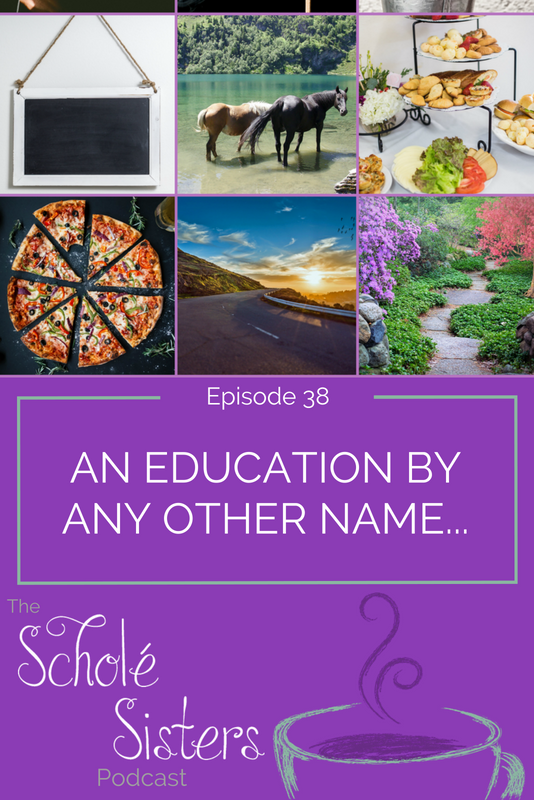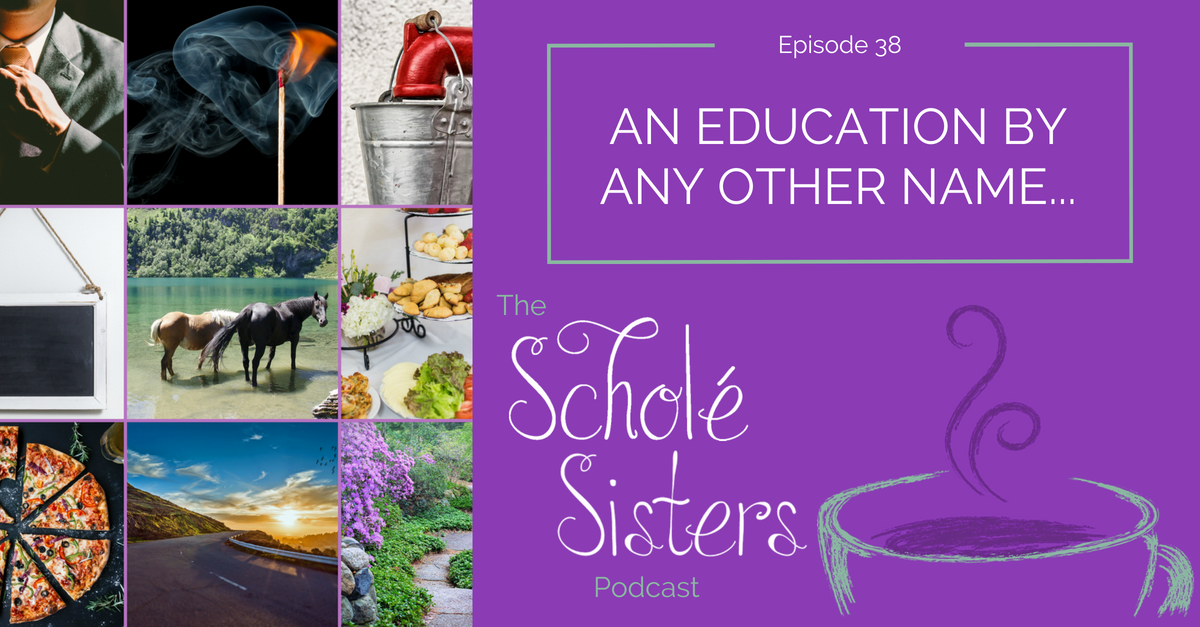SS #38: An Education by Any Other Name…
In today’s episode, Mystie, Pam, and Brandy discuss the power of educational metaphors – are we using the right images to picture our homeschools? Metaphors aren’t absolute — it’s what we mean by them and how we apply them that matters. Join the Scholé Sisters as they hash out metaphors and discuss what makes a good one worth using.

Thank you to our sponsor:

Listen to the podcast:
Podcast: Play in new window | Download
Show Notes:
- Scholé Every Day
- Pam:
- Michelle’s Notebooks on Instagram
-
- Michelle’s trace transfer video
- Michelle’s trace transfer video
-
- Michelle’s Notebooks on Instagram
- Brandy:
A red scholé cart!!
- The Mother Culture Summer Reading List (includes habit track for mother culture reading challenge that Pam mentioned)
- The Mothers’ Education Course Summer Reading List
- Why Brandy is not pre-reading next year: Welcome to the Classical Grind
- Jennifer Mackintosh
- Mystie:
- Pam:
- Topical Discussion: Educational Metaphors
- Education is your job.
- Education is not the filling of a bucket but the lighting of a fire. (Loose paraphrase of Yeats there…)
- Education is writing upon a blank slate.
- Education is bringing a horse to water.
- Stratford Caldecott
- “Education is a life” vs. “Life is education.”
- Education is a Life episode
Education of a Wandering Man by Louis L’Amour Education of a Wandering Man by Louis L’Amour
- The Charlotte Mason quote Brandy couldn’t remember:
- “We supplement this direct ‘nature walk’ by occasional object-lessons, as, on the hairs of plants, on diversity of wings, on the sorts of matters taken up in Professor Miall’s capital books; but our main dependence is on books as an adjunct to out-of-door work––Mrs. Fisher’s, Mrs. Brightwen’s, Professor Lloyd Morgan’s, Professor Geikie’s, Professors Geddes’ and Thomson’s (the two last for children over fourteen), etc., etc. In the books of these and some other authors the children are put in the position of the original observer of biological and other phenomena. They learn what to observe, and make discoveries for themselves, original so far as they are concerned. They are put in the right attitude of mind for scientific observations and deductions, and their keen interest is awakened. We are extremely careful not to burden the verbal memory with scientific nomenclature. Children learn of pollen, antennae, and what not, incidentally, when the thing is present and they require a name for it. The children who are curious about it, and they only, should have the opportunity of seeing with the microscope any minute wonder of structure that has come up in their reading or their walks; but a good lens is a capital and almost an indispensable companion in field work. I think there is danger in giving too prominent a place to education by Things, enormous as is its value; a certain want of atmosphere is apt to result, and a deplorable absence of a standard of comparison and of the principle of veneration. ‘We are the people!’ seems to be the note of an education which is not largely sustained on books as well as on things.” (Vol 3 p. 237-238)
The Great Tradition by Richard Gamble
- Lectio Divina episode with Pam and Ashley Woleben
- Education is a feat.
- Education is a MEAL.
- Education is a journey, not a destination.
- Education is a path to be traveled.
- Education is a hobby.
- What happens inside a classroom = education.
The Graves of Academe by Richard Mitchell
- Action steps:
- Identify the metaphors you have in your head and whether those are the pictures you want to have defining what you’re doing.
- Think of how you are applying those metaphors to your homeschool.
- Bring the language of your metaphors to the surface and check for negative applications (even if the metaphors are in themselves good ones).
Please leave us a review in Apple Podcasts!
If you upgraded to iOS 11, you’ll find leaving a review easier than ever. Just go to Scholé Sisters in your subscriptions and scroll down.








While y’all were talking, I was thinking about vocation. In my Lutheran tradition, we talk a lot about vocation, and I think it is helpful way of thinking about our stations in life. This is how we look at it: A baby needs to eat, so God gives the baby a mother to nurse it. So the baby is being fed by God through his mother. This is a vocation. So my vocations are sister, daughter, mother, wife, and so on. My children’s vocations are sister/brother, daughter/son, student. My husband’s list would also include worker. In these vocations, we love and serve our neighbors. It is different than a job in how it is viewed. My husband works, and, as he works, he considers that he is to not be lazy or shirk his duty to his boss. I feed my children good meals, and as I feed them, I try to be joyful in my duty to feed them. My children do their school work, and as they do this, they try to work hard and not shirk their duty, doing it joyfully. We consider our lives in light of the 10 Commandments in our vocations, so in our vocations we can see how we sin daily and much, but we also see how we can joyfully do the tasks that God has placed before us, being thankful to God that He provides for our needs through our neighbors. There are several books about vocation that use this perspective, and it has been a while since I’ve read one, but I thought I’d share the titles with you.
There is a brief article here https://www.google.com/url?sa=t&rct=j&q=&esrc=s&source=web&cd=4&ved=0ahUKEwi88Om8ganbAhUkKX0KHYu7BBsQFghHMAM&url=https%3A%2F%2Fwww.lcms.org%2FDocument.fdoc%3Fsrc%3Dlcm%26id%3D607&usg=AOvVaw1zdcMKdGBuwRgfNIqj_e3t
Here are some books on the topic: Gustaf Wingren called Luther on Vocation, God at Work by Gene Edward Veith, Family Vocation by Gene Edward Veith and Mary J. Moerbe, Vocation by Chad Hoover, and The Lutheran Difference: Christian Vocation by Angus Menuge. I have read a couple of these, and Family Vocation is on my list of books to read. It is an interesting way of thinking, and for me, it is very helpful. It has a lot of the nuances that you ladies were talking about when speaking of the metaphor about education being a job. It isn’t the same thing as a job at all, but we are able to love and serve our neighbors while we are being educated and due to our education.
Vocation! You’re so right! I wish I’d thought of that during the show — I even read God at Work a year or two ago. Thank you for the reminder — you’re right that vocation brings about that correct balance of duty and joy. ♥